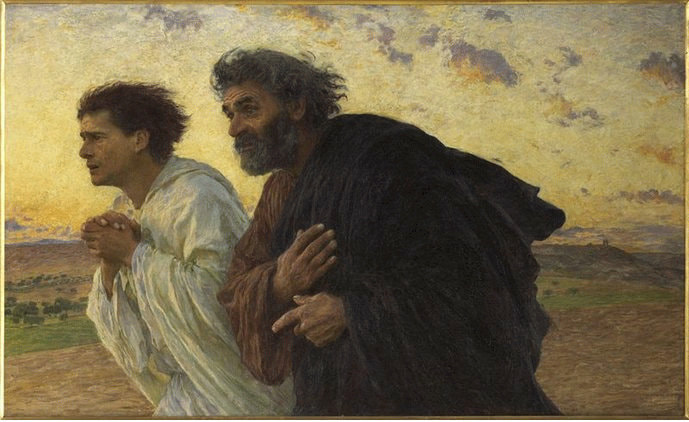|
John 20:1-9 (NRSVCE) Early on the first day of the week, while it was still dark, Mary Magdalene came to the tomb and saw that the stone had been removed from the tomb. So she ran and went to Simon Peter and the other disciple, the one whom Jesus loved, and said to them, “They have taken the Lord out of the tomb, and we do not know where they have laid him.” Then Peter and the other disciple set out and went toward the tomb. The two were running together, but the other disciple outran Peter and reached the tomb first. He bent down to look in and saw the linen wrappings lying there, but he did not go in. Then Simon Peter came, following him, and went into the tomb. He saw the linen wrappings lying there, and the cloth that had been on Jesus’ head, not lying with the linen wrappings but rolled up in a place by itself. Then the other disciple, who reached the tomb first, also went in, and he saw and believed; for as yet they did not understand the scripture, that he must rise from the dead. This is perhaps the most important passage in Scripture, as it’s where we find out that John is a faster runner than Peter. I’m not quite sure why that’s important, but John sure thought it was important enough to mention that Peter wasn’t as fast as he was.
More seriously though, that bit of this passage does seem to tell us something. All throughout his Gospel, John refers to himself as “the beloved disciple.” He is the one who Jesus loved most, he is the one who laid his head on Jesus' breast. He is the closest to Christ of any of the disciples. So when he heard Jesus’ body was missing, he was the most concerned. We can imagine John and Peter both taking off running, but John being completely overtaken by emotion was not even aware of how out of breath he was or how sore his legs were. His only concern in the entire world at that moment was Jesus. And so he arrived at the tomb first. But notice that he does not enter right away. He merely peeks his head in. He arrived at the tomb first, but the first person to enter is Peter. John, the beloved disciple and the closest to Christ, waits for Peter to enter before entering himself. Even Mary Magdalene, the first to see the empty tomb, does not enter. She too waits for Peter. There’s something about Peter which makes both John and Mary defer to him. Peter was first among the disciples. Christ placed him at the helm. When he made the ultimate proclamation “You are the Christ, the Son of the living God" (Matthew 16:16), Christ gives him the name Peter, and proclaims that he is the rock upon which the Church will be built. Even though Peter gets rebuked shortly after, and even though Peter is the one who denied Christ three times, he remains in a position of authority and leadership among the disciples. And even though the beloved disciple was closer to Christ than Peter was, he remembers Peter’s role and defers to him. There is, of course, the simple literary play here. Luke had already recorded in his Gospel by this time that Peter was the first to enter the tomb. John, writing his Gospel later, obviously didnt want to contradict Luke, so he has himself arriving first but Peter still entering first. But the message he is conveying is the same. Christ has called Peter to a particular vocation, to lead the disciples. John knows this, and respects Christ’s decision. So he defers to Peter. This is not so much about consistency of Scripture, or who is more important, or who is more loved. It’s about vocations. John, beloved as he was, was not called to a vocation of the same kind as Peter, nor was Mary. Peter’s vocation was unique We all have our own vocations, the life that God calls us to. And no matter what life we are called to, though it may be similar to those of other people (as John remains an Apostle like Peter, even if he is not the leader), it will be in a special way unique to each of us. Our role is to trust in Christ to provide the vocation most fitting for us, to lean on him in discerning the life we are to lead, and by the grace of God to faithfully live out that vocation to the best of our ability. Peter was not the beloved disciple, but that does not mean he is not in his own way special. So too we each have our roles to play. It is up to us to respond to those callings, as the disciples did. |
ArchivesCategories
All
|

 RSS Feed
RSS Feed